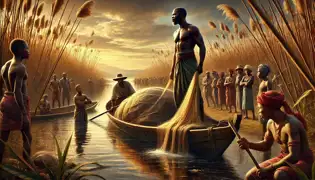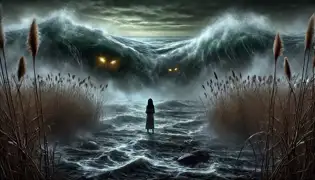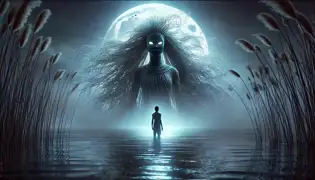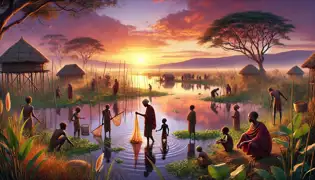The Bangweulu Wetlands, stretching across northern Zambia, are more than just a natural marvel. To outsiders, it’s a haven for birdwatchers, a place of breathtaking sunsets and waters brimming with fish. But to the people of Mansa village, Bangweulu is alive—a sacred entity whose spirit demands respect. At the heart of this belief is the legend of Chitalu, the Lake Spirit, said to guard the waters with both mercy and wrath.
This story begins in the season of abundance, when fish swam thick in the shallows, and the reeds whispered in the wind. For Mwansa, a curious girl of sixteen, the lake was both home and wonder—a canvas where her dreams played out. But her world was about to change, shaken by an act of greed and a reckoning from the depths of Bangweulu. The first light of dawn crept over Mansa, bathing the village in soft gold. Mwansa stood at the edge of the lake, her toes sinking into the cool sand. She loved this time of day—the stillness before the world woke, the way the water mirrored the sky so perfectly it felt like a gateway to another world. “Mwansa,” her grandmother Nasilele’s voice broke the stillness, firm but tinged with worry. She approached with a walking stick in hand, her weathered face framed by a scarf. “How many times must I tell you not to stray too close? The lake is not just water; it has eyes, child.” Mwansa laughed lightly, turning to face her grandmother. “I’m not afraid of old tales. Chitalu hasn’t shown herself in years.” Nasilele’s expression hardened. “That’s because we’ve respected her rules. But one wrong move, and she’ll remind us why the lake belongs to her.” The villagers lived by a delicate code: only take what you need, leave the reeds untouched, and never set nets in sacred waters. Mwansa had grown up with these rules etched into her mind, though she often wondered if they were rooted in truth or fear. Little did she know that the lake would soon answer her question. The air buzzed with unease when a stranger arrived in Mansa. He was tall, broad-shouldered, and confident—too confident for the villagers’ liking. His name was Bwalya, and he came with a large boat and an even larger net, the kind that could strip a section of the lake bare in hours. “Who is this man?” Mwansa asked as she watched him unload his gear by the shore. The villagers gathered at a distance, their whispers a mix of curiosity and disapproval. Nasilele shook her head. “A man who does not belong here. He does not respect the lake.” Bwalya was unbothered by the wary eyes following him. That evening, as the sun dipped below the horizon, he set his enormous net into the water. When he hauled it back, it was bursting with fish. The villagers watched in stunned silence, their mouths dry with disbelief. Such abundance should have been impossible. “See? No spirits stopped me,” Bwalya boasted, grinning as he piled his catch high. But the elders weren’t impressed. They approached him as a group, led by Nasilele. “This lake is not like others,” she warned. “It has a spirit, and she does not tolerate greed.” Bwalya laughed. “I’ve fished in lakes all over the land. Spirits are just stories to keep children from wandering too far. Your lake is no different.” The villagers returned to their homes in uneasy silence. The lake, so calm in appearance, seemed to hum with tension. The next morning, Mwansa awoke to a strange sound. It wasn’t the usual birdsong or the rustle of reeds but a low, resonant hum that seemed to emanate from the lake itself. When she stepped outside, the sight froze her in place. The waters of Bangweulu, usually placid and reflective, were churning violently. Waves slapped against the shore, and a dense mist rolled across the surface. In the mist, Mwansa thought she saw something—a flicker of light, like eyes staring back at her. Her stomach tightened. She ran to find Nasilele, who stood at the lake’s edge, her face grim. “The spirit is restless,” the old woman murmured. “This is her warning.” Later that day, Bwalya’s boat was found drifting aimlessly. His massive net was torn to shreds, fish scattered like offerings across the surface. But there was no sign of Bwalya himself. The villagers gathered in stunned silence, their fear palpable. “Is he… gone?” Mwansa asked, her voice trembling. Nasilele nodded slowly. “He has been taken. And the spirit will not stop with him if we do not act.” Despite the fear gripping the village, Mwansa couldn’t shake her curiosity. That night, as the moon bathed the lake in silver light, she ventured to the water’s edge. Her heart pounded as she stepped into the shallows, the cold water lapping at her ankles. “Mwansa,” a voice whispered, soft and melodic yet filled with power. She turned sharply, her breath hitching. From the mist rose a figure unlike anything she’d ever seen. It was a woman, her hair flowing like reeds, her skin glistening like water under moonlight. But it was her eyes that held Mwansa captive—two glowing orbs that seemed to see into her very soul. “Why have you come here, child?” the figure asked. Her voice was both beautiful and terrifying, echoing as if it came from the depths of the lake. Mwansa fell to her knees, trembling. “I… I wanted to understand. Why do you punish us?” The spirit, Chitalu, tilted her head, her expression softening. “I do not punish. I protect. This lake is a balance, and those who disrupt it threaten all who depend on it. Tell your people to honor the waters, and I will ensure their survival.” The next morning, Mwansa shared her encounter with the village. Some were skeptical, dismissing it as the imaginings of a frightened girl. But Nasilele believed her. “Chitalu has spoken,” the elder said. “We have a choice: to listen or to suffer.” The villagers came together to decide their course of action. It wasn’t easy. For years, the lake had provided abundantly, and the thought of restricting their harvest felt like inviting hardship. But Mwansa’s courage and Nasilele’s wisdom swayed the hearts of many. They agreed to restore balance. The fishermen adopted smaller nets, careful not to take more than their share. Women replanted reeds along the shore, mending the scars left by human hands. And each evening, the village gathered to offer prayers to Chitalu, asking for her guidance. Weeks turned into months, and slowly, the lake began to heal. Fish returned in greater numbers, and the reeds flourished once more. Mwansa often sat by the water, watching its surface ripple gently in the breeze. She felt a connection to the lake she’d never known before—a sense of peace and purpose. One evening, as the sun dipped low, Mwansa saw something that made her heart leap. In the distance, just beneath the water’s surface, she caught a glimpse of glowing eyes. It was Chitalu, watching, guarding, and—Mwansa liked to believe—smiling. Years later, Mwansa became the village elder, passing down the story of Chitalu to a new generation. She taught them to respect the lake, not out of fear but out of gratitude. For Bangweulu wasn’t just a source of life; it was life itself, a sacred bond between people and nature. Today, the Bangweulu Wetlands remain a place of wonder, their shimmering beauty a testament to the harmony between man and spirit. And if you ever visit, you might hear the whispers of Chitalu in the reeds, a gentle reminder to honor the waters that give us life.A Warning from the Elders
The Stranger and His Net

The First Omen
Mwansa’s Encounter

The Villagers’ Choice

The Spirit’s Blessing
Legacy

The End.



















